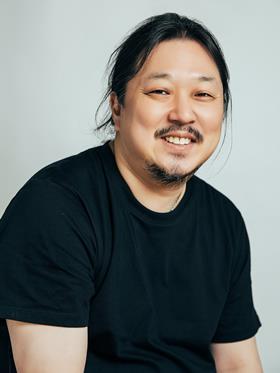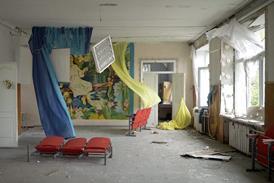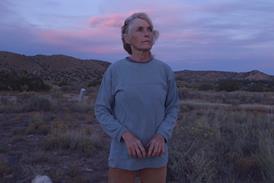Despite assembling its biggest programme to date, the New York Asian Film Festival (NYAFF) remains one of the most tightly curated festivals on the circuit.
Samuel Jamier, executive director of NYAFF, has traversed Asia and worked through festivals from Cannes to Manila to seek out the best new films from the region with the help of his programming team. It has resulted in an eclectic line-up of close to 80 films that include buzzy titles from Japan, China and South Korea but also Malaysia, Singapore, Kazakhstan, Thailand and the Philippines among others.
“Exploring these countries, there are so many exciting filmmakers out there,” says Jamier. “It is why I’m always shocked to see the same names repeated at international film festivals. There may have been a few discoveries this year but most fall into the category of predictable Asian arthouse for the European audience. There is so much more going on in places like Central Asia and Mongolia.”
The 22nd edition of the festival runs July 14-30 at New York’s Film at Lincoln Centre, where NYAFF has now been based for more than a decade. The slate includes eight world premieres, nine international premieres and 32 North American premieres across a wide range of genres.
The festival opened with the North American premiere of Korean genre mashup Killing Romance and director Lee Won-suk attended the sold-out screening with lead actor Lee Sun-kyun, known for his roles in Bong Joon Ho’s Parasite and A Hard Day.
“We’re on track to easily outperform what we did last year, in terms of box office,” says Jamier. “We are way ahead.”
The nine-strong competition for the Uncaged Award for best feature film at the festival, includes the world premieres of Hong Kong horror Back Home and Chinese films Flaming Cloud and Redemption With Life. Back Home is a suspense horror that marks the feature directorial debut of Nate Ki and stars Anson Kong from Cantopop boy band Mirror, both of whom will attend NYAFF.
“This is one of our best years in terms of the competition titles,” says Jamier of the line-up, which features films from eight different countries. “We went out of our way to secure the best titles possible.”
These also include Jin Ong’s Abang Adik, which became the first feature from Malaysia to win the top prize at Udine’s Far East Film Festival; and horror thriller Faces Of Anne from Thailand’s Rasiguet Sookkarn and Kongdej Jaturanrasmee. (More on the competition titles here)
Awards and star power

Kong and Parasite star Lee are among several stars and filmmakers due to attend this year’s festival.
Hong Kong actor and producer Louis Koo will receive NYAFF’s Extraordinary Star Asia Award for Exceptional Contribution to Asian Cinema and introduce The White Storm 3: Heaven Or Hell as well as Vital Signs, in which he plays “the Dirty Harry of paramedics”. One of Hong Kong’s biggest stars, Koo led sci-fi action thriller Warriors Of Future, which became the highest-grossing Asian film of all time in the territory following its release last August. He also founded One Cool Group, now the biggest local studio in Hong Kong.
Due to receive the Screen International Rising Star award is Japanese actor Ryohei Suzuki, who has been gaining increased attention for his roles in films such as Last Of The Wolves, for which he won best supporting actor at last year’s Japanese Academy Awards, and Daishi Matsunaga’s LGBTQ+ romance drama Egoist, which will screen at NYAFF. He will next be seen in Netflix’s manga adaptation, City Hunter.
The festival will also bestow its Best From The East Award to Korean actress-musician Lee Hanee, who appears in Killing Romance and box office hit Phantom, while the Screen International Star Asia Lifetime Achievement Award will go to Junji Sakamoto, the acclaimed Japanese writer and director who has primarily worked outside the country’s studio system on titles such as Face, KT and more recently Okiku And The World.
Tackling streaming challenges

Festivals such as NYAFF were previously one of just a few avenues for US audiences to discover films from Asia. But the advent of streaming platforms has changed the game and while the popularity of Asian culture has surged with the likes of Squid Game, Parasite and Everything Everywhere All At Once, it has presented new challenges.
“Streaming platforms ensure you can watch foreign films from your lounge and don’t need to travel to a festival to watch something from Vietnam,” says Jamier. “It used to be a rare experience but with this new paradigm of total accessibility, I think big festivals should cut down their programmes. The smorgasbord approach in the age of Netflix and massive digital libraries doesn’t make sense anymore.”
“For an international film festival, 100-150 films makes sense, not 300,” he adds, following the Berlinale’s recent decision to cut back its programme. “At some point, you need to make a selection. People can watch films all the time on Netflix for $15 a month. That’s the price of a movie ticket right there.”
Streamers are among those in the crosshairs of SAG-AFTRA strikers, who are seeking better pay and working conditions, and saw around 160,000 performers stop work at midnight on July 14 including red carpet premieres, promotional interviews and events.
While the US-led action may not significantly affect the Asian festival, Jamier said: “Like all film organisations or businesses based in America, or that are American, we are of course impacted by this, and 100% supportive. The business of film has become increasingly and shockingly exploitative, and we have been following the conflicts and their handling with concern, and sometimes dismay. Change cannot happen with some serious action.”
While the festival’s closing film has yet to be announced, it is understood to be a title with talent that may not attend due to the strike.
“Whatever negative impact we might suffer we fully accept in the name of those who make films possible, be they writer or actors,” added Jamier.


























No comments yet